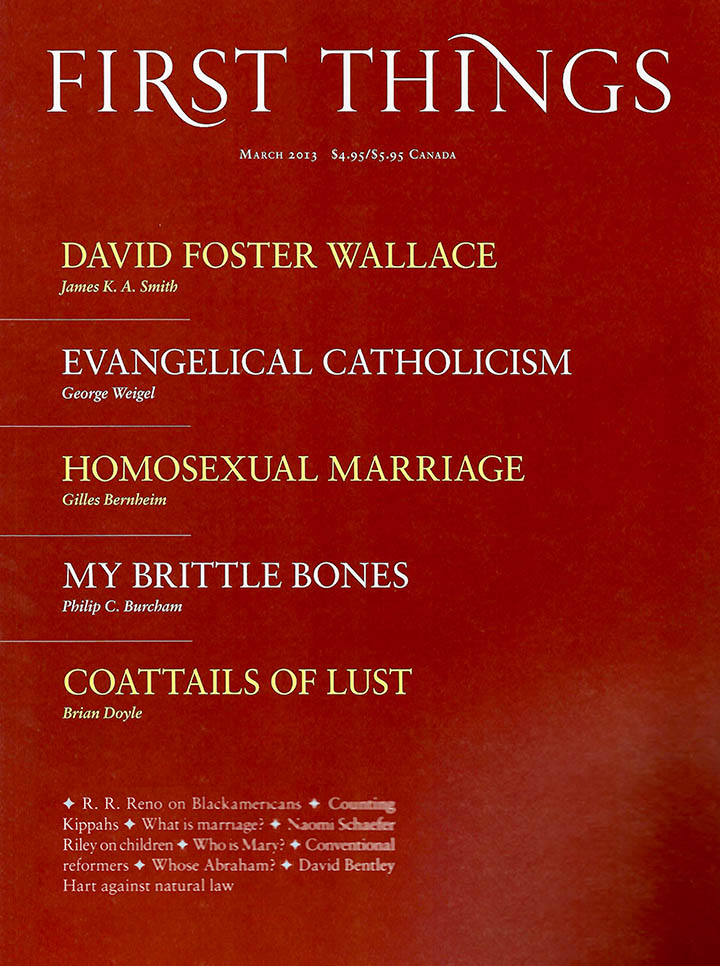Inheriting Abraham: The Legacy of the Patriarch in Judaism, Christianity, and Islam
by Jon D. Levenson
Princeton, 288 pages, $29.95
In the wake of the religiously colored violence of 9/11 and the anxieties it spawned, numerous efforts in the West were made to engage Muslims in common discussions aimed at better mutual understanding. The term “Abrahamic faith traditions” was adopted to include the three monotheistic religions in dialogue, expanding “Judeo–Christian” relations to embrace Islam. Did they not all share Abraham as a venerable founder? It was time to move from dialogue to “trialogue.”
To the degree that “Abrahamic” was merely a nominal place setter for this trialogical configuration, its use was perhaps innocuous. But calling Judaism, Christianity, and Islam “Abrahamic” has, in some cases, presumed a shape to the discussion and to its outcome: that is, the discovery of some common religious commitment derived from shared roots that should give rise to shared religious values and actions.
Jon Levenson’s new book is a brilliant questioning of this presumption and thus of the use of “Abrahamic.” He questions it, however, for the sake of mutual understanding. But while, as a Jew, Levenson himself can speak of an “Abrahamic tradition,” this term as generally used is really but a tag for a variety of text- and tradition-specific commitments that make use, in very different and sometimes contradictory ways, of a common human figure.
Each religion’s Abraham is not the same man as the others’ Abraham and does not embody the same religious claims, emphases, or even values. There are no “coequal” Abrahamic traditions, only mutually exclusive ones, where the witnesses for Abraham’s identity give conflicting testimony.
Levenson’s approach is thoroughly theological but also contextually calibrated: What does Abraham mean for Jewish, Christian, and Muslim people of faith? Adopting a narrative-chronological order in engaging this question, Levenson begins with the Genesis account of Abraham’s story, proceeding sometimes verse by verse, making his way almost reverently, and then pondering the text’s presentation and engaging the later interpretation of passages.
There are diversities of perspective within each tradition, of course, and it is the subtlety of Levenson’s untangling of some of this variety that makes the book so rich. The paternal relationship of Abraham to many “nations,” for instance, has elicited varying explanations, engaging the biological, conversionary, and covenantal elements of the story, all drawing on the text but also taking hold of one strand at the expense of another.
Levenson notes how Maimonides opts for a conversionary interpretation that is itself a restrictive interpretation. Or again, he identifies the shifting relationship of faith and obedience (“works”) in both Jewish and Christian discussions of Abraham, attitudes that are more varied than some versions of theological history allow, and his treatment of the Letter of James is wonderfully illuminating in this context.
This approach allows him to disengage and articulate several key differences in how each religion views Abraham: The Jewish Abraham founds an elect nation; the Christian Abraham founds a salvific faith for other nations; the Muslim Abraham offers a model of anti-idolatrous obedience for all nations. The contours of each version are communally specific and provide for each religion normative and finally exclusivist claims vis-à-vis the others, in a way that shuts the door to any search for some deeper commonality underpinning the three. Simply claiming a common historical figure, detached from particular Scriptures and the varied traditions that read these Scriptures and refashioned their meanings, provides at best a weak, and at worst an illusory and misshapen, framework for mutual understanding, drifting into generic humanism and relativism.
The unconditional Abrahamic promises that define God’s relationship to a genealogically contoured nation (Israel) cannot be subtracted from a more basic theistic religion. The Abrahamic “faith” of the Christian is decidedly oriented toward the incarnating act of God in Jesus and cannot be refashioned into a thematically rendered moral devotion, and the historical vision of Islamic revelation cannot be reworked to render innocuous the perversions of Jewish and Christian idolatry. To do so would be to dissolve each religion and the world it claims or conjures when it turns to Abraham as a key focus or explicator of its faith.
From the perspective of interfaith dialogue, Levenson’s deliberate and contextualized reading of texts has some important consequences. The first, obviously, is descriptive accuracy: It guides attention to the actual nuances, diversities, and distinctions in understanding that mark different meanings for the person named “Abraham” by each religion. Just this exercise in accurate description is important, because careful attention to the text discloses how different the embodied Abraham is from the abstracted ecumenical Abraham.
But who invented the myth itself, and what shall we replace it with? Although Levenson does not discuss this, the notion of some kind of shared religious affiliation through Abraham was already apparent in the claim of ninth-century Muslim apologists that he was the “first Muslim,” to whom Jews and Christians are naturally, because historically, subordinate. This was not a claim for equal filiation, but it did draw the three faiths together under one ancestor.
The movement toward viewing the “Abrahamic religions” as equivalent arose eight hundred years later and first had to pass through a negative articulation before it could provide the basis for positive dialogue. The hugely popular French Treatise on the Three Impostors (Moses, Jesus, and Muhammad), an anti-Christian tract from the early eighteenth century, took up the long-standing Christian charge of Muhammad’s deceit and simply spread it around to all three religious “founders.”
This lying triumvirate, however, migrated, more positively in the hands of later Deist writers, into an argument about their respective foundings of three “civil” legislations that were each based on natural law. It was a view that Lessing took up in his famous play Nathan the Wise.
While the term “Abrahamic” had been used by Christian theologians to identify a particular divine dispensation of law (“the Abrahamic covenant”), it was soon taken over by the historians of natural religion and entered into the lexicon of budding historical criticism and its more skeptical partner, the “history of religions.” The evolution of the term into its usual contemporary sense—a joining point for a common monotheistic outlook—reaches its conclusion in someone like the Old Testament critic Thomas Cheyne, an Anglican who converted to the Baha’i faith in the early twentieth century and espoused one of the earliest versions of a universal “Abrahamic faith.”
Today’s dialogue partners often work out of a Kantian paradigm of moral righteousness, in which the particular commands of a self-revealing God are problematic in the face of a putatively deeper universal ethical consciousness: Distinctive religious claims end up taking a backseat to common human discernment. Projected onto Abraham, such a moral vision bedevils fair understanding of each religion’s actual beliefs and has in fact fed into negative stereotypes, as matters such as circumcision, sacrifice, and purity inevitably appear to be local perversions of a more rational theistic devotion that ecumenical endeavor seeks to apprehend and disseminate.
Not all universalist versions are equal, however, and there are ways of framing them that do not rely on Kant. The philosopher Ismail al-Faruqi presented in his famous book Trialogue of the Abrahamic Faiths (1982) a suspiciously Islamo-triumphalist conception when it came to “unity,” for it was one based on a natural law theory bound to decidedly qur’anic social ordering. Careful attention to religious particulars is a duty, not a luxury.
If there is no “Abrahamic religion” where Abraham’s genealogy offers a bridge of relationship among competing religions, is there no basis at all for “coming closer”? Levenson is not really interested here in addressing theologically the imperative for dialogue. Still, Christians especially will want to know what to do with his discussion, and Levenson would seem to urge them to look at their own tradition for a start.
On this matter, Christians may well have a duty different from that of Jews or Muslims. Lumen Gentium decreed that Muslims “profess to hold the faith of Abraham, and together with us they adore the one, merciful God.” John Paul II proclaimed in 1985 to young Muslims gathered in Casablanca that “your God and ours is the same, and we are brothers and sisters in the faith of Abraham.”
How did we get from St. Paul’s relatively constricting vision of Abraham, as receiver of a promise of exclusive faith, to one where this vision is opened up to some broader natural or anthropological mystery of supernatural orientation and embrace, such that “faith” now is granted a nonspecific focus outside Christ?
The theological movement here has been real, however difficult. Louis Massignon, the twentieth-century Catholic scholar of Islam, argued that Abraham’s “natural religion” was regiven to Islam in the face of the providentially ordered failures in Jewish and Christian human witness. It is not so much a logic of “Abrahamic religion” that binds the three religions together as it is a set of particular historical decisions by the Christian God, to whom Christians are called to submit in a unique posture of, again specifically Christian, discipleship.
Levenson will have none of this kind of speculation. His response is one of the few polemical moments in this otherwise gentle volume. But he may misunderstand Massignon’s purpose here. For the general providential claim that Massignon made, based in part on a divine adjustment to the contingencies of historical faithlessness by Christians and others, has already been used in Christian–Jewish dialogue.
Has there not been a parallel reinterpretation of the gospel’s relation to Jewish Israel, in the shadow of Christian moral failures vis-à-vis Jews over the centuries? Perhaps, as Massignon suggested, we stand toward one another differently now because of our past actions, and it is this difference, not some uniform set of historical-theological principles, that needs to be investigated.
The point is that these kinds of investigations must be done by the believing traditions themselves rather than out of the Kantian paradigm now dominant. They will need to be done on the terms finally of their own self-understanding. We are barely at the outset of such efforts, so there is little to say about where they might lead.
Whether we pick up the thread left by Vatican II or take some other route, Levenson’s work and method will be a part of the task. He has made it clear that there is no deep religious unity awaiting our uncovering; if there is to be peace among the religions, it will need to be constructed.
Ephraim Radner, a member of First Things’ advisory council, is professor of historical theology at Wycliffe College in Toronto.


